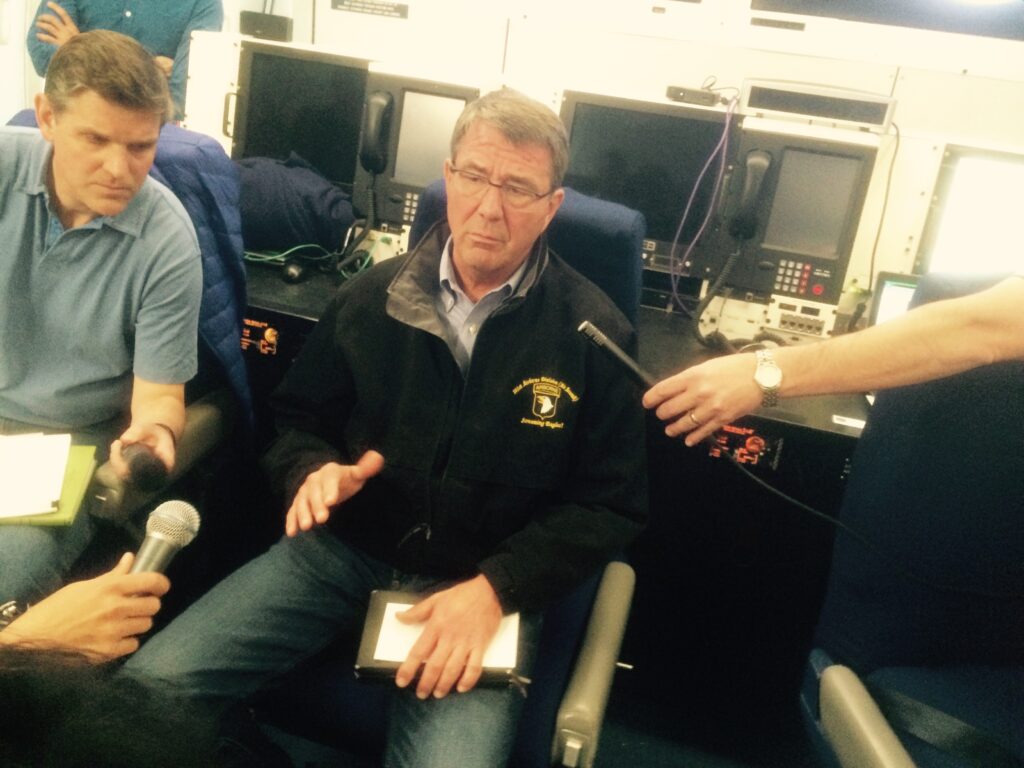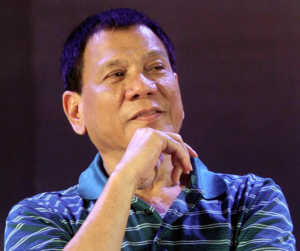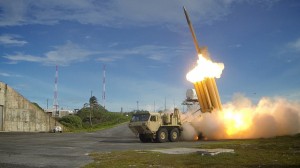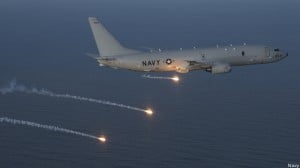US Won’t Back Off On Korean Missile Defense, South China Sea: SecDef
Posted on

Defense Secretary Ash Carter speaks to reporters en route to Singapore.
ABOARD SECDEF1: The US will remain steadfast in the face of Chinese complaints as it builds its Pacific coalition, Defense Secretary Ash Carter made clear to reporters en route to the Shangri-la summit in Singapore.
Carter and his staff already are looking past the secretary’s speech here on Saturday to two potential flashpoints this summer:
First, this month, South Korea and the US will probably announce the deployment of an American THAAD missile defense system to the peninsula. China has objected that a THAAD battery could potentially shoot down planes in Chinese airspace, not just North Korean missiles. Carter told the press repeatedly that “this is an alliance decision” about self-defense– in other words, Beijing shouldn’t worry and doesn’t get a vote. This is, after all, self-defense and the decisions of two treaty allies.
In July, the Hague tribunal on the UN Convention on the Law of the Sea (UNCLOS) is expected to rule on a Sino-Philippine dispute in the South China Sea. (The ruling may come earlier). China won’t abide by the tribunal’s ruling and has hinted it will respond by declaring an Air Defense Identification Zone (ADIZ) over the disputed area. While unilaterally declaring authority over air traffic in this way would be “provocative,” a senior defense official told reporters, “such a declaration would not affect our own military operations, as the declaration (of an ADIZ in 2014) in the East China Sea did not.”

Philippine president-elect Rodrigo Duterte
The Philippine Problem
Complicating the South China Sea calculations is the election of a new populist president in the Philippines, Rodrigo Duterte, who’s questioned the American alliance, which was recently strengthened by the outgoing Philippine d administration. US Air Force A-10 Warthogs have patrolled the South China Sea from Philippine bases under the Enhanced Defense Cooperation Agreement (EDCA), but that was a short-term deployment and a follow-on unit hasn’t yet been announced.
Carter assured reporters the enhanced alliance with a strategically pivotal — but militarily weak — ally is not in question. “Our plans for EDCA implementation are on track; we haven’t changed our plans at all,” said the secretary. “We look forward to working with the new Philippine government, as we always do [with] a new government in a democratic ally.”
“We certainly understand the Philippine desire to ‘chart their own course,'” said a senior defense official, paraphrasing one of Duterte’s maxims. “Everything we do in the context of our alliance with the Philippines is designed to allow the Philippines to chart its own course.”
Carter has no plans to meet either the Philippine or the Chinese delegations during the Singapore summit. The new Philippine defense minister hasn’t been named and the Chinese defense minister doesn’t come to Shangri-la, so there’s no counterpart for Carter to sit down with. There will be plenty of other opportunities for dialogue, with key Carter staffers splitting off on Saturday to go to Beijing for the sixth Strategic Security Dialogue (SSD) there.
The SSD is a series of annual meetings between senior US and Chinese officials. In preparation for the upcoming talks, officials met May 19 in Washington at the State Department. That one included “candid, constructive discussions between the two sides on strategic security issues – including maritime issues.” Translate that from diplomatic speak and you’ve got the US and Chinese leaning across the table, speaking forcefully and glaring at each other (candid) about the Freedom of Navigation operations in the South China Sea and related maritime issues. Constructive means they didn’t disagree so violently that they had to cancel the meeting but were able to at least produce an aide memoire or similar for their principals about what they disagreed upon.
That’s sort of emblematic of US-Chinese security talks.

THAAD missile launch.
Korean Missile Defense
“We have elements of cooperation, strong elements of cooperation, with China, even as we have some elements of competition,” Carter said, taking particular pains to praise Chinese pressure on North Korea. “Now, I don’t want speak for the Chinese, but I think everybody’s very frustrated at North Korean behavior.”
But, asked one reporter, don’t five North Korean missile tests in a row (albeit all failures) call for a reappraisal of the threat?
“Whatever the outcome of the test, the fact remains that they’re trying to make those missiles fly,” said Carter. “Whatever the outcome, this is something that is provocative. It’s destabilizing. It’s contrary to the United Nations Security Council resolutions.”
It’s this missile threat that seems to have finally convinced South Korea to ask for an American THAAD battery, supplementing shorter-range Patriot missile defense systems. (Both are US Army systems, underscoring the often-overlooked role of land power in the Pacific). Carter will meet in Singapore with his South Korean counterpart, he said, and “I’m sure that topic will come up, (but) it’s not something we need to discuss much…because the plans are moving forward.”
“This is an alliance decision, a decision of the United States and the Republic of Korea which is about protecting us both from North Korean missile attack,” Carter said. “It’s an alliance decision, (and) the implementation of it will be a series of decisions that we take together.”
“There are a lot of technical issues to get through,” a senior defense official elaborated — a phrasing which implies the political and strategic issue of whether to deploy THAAD is settled and now it’s just a question of how. “We will have a public announcement soon, but I’m not in a position to give you exact timing.”

P-8 Poseidon
A “Network of Principled Security”
While the US strengthens its longstanding formal alliances with Korea and the Philippines, it’s also building military ties to non-treaty partners. Formerly Non-Aligned India is becoming increasingly close to the United States. In Vietnam, once America’s bitter enemy, the US plans to stockpile humanitarian supplies and has lifted restrictions on export of lethal weapons.
The host country for Shangri-La itself, Singapore, has long hosted rotational deployments of Littoral Combat Ships and now of Navy P-8 Poseidon patrol planes as well. Carter and his Singaporean counterpart will fly aboard one P-8 tomorrow. While P-8s are lightly armed, their extensive surveillance suites makes them tremendously unwelcome to the Chinese, whose fighters have conducted occasionally dangerous interceptions.
“There’s a tremendous amount of development of what I’ve called this network of principled security,” Carter summed up. “Now none of this is aimed at anyone. It doesn’t aim to isolate anyone.”
It may not be designed to isolate anyone, but it’s certainly aimed at pressuring China to behave differently and to accept the existing liberal rules-based international order.
Colin contributed to this story from Washington.
Subscribe to our newsletter
Promotions, new products and sales. Directly to your inbox.
